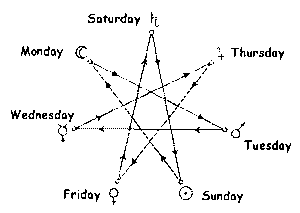Chaldean series

The Chaldean series, which was handed down in Ptolemy's Tetrabiblos, but which originated with the Chaldeans or Babylonians[1] and still determines the order of our weekdays today, is based on the following arrangement of the planets:
| Saturn (Saturday) - Sun (Sunday) - Moon (Monday) - Mars (Tuesday) - Mercury (Wednesday) - Jupiter (Thursday) - Venus (Friday). |
This order also corresponds to the seven stages of world evolution that our planetary system passes through in the course of its development. The names of the planets, however, do not refer directly to our present planetary system, but to the so-called occult planets of the same name, which are earlier or future embodiments of our Earth. Our present state on Earth is represented by Mars and Mercury together, since according to Rudolf Steiner's findings the Earth's development is divided into a Mars half and a subsequent Mercury half:
| Old Saturn - Old Sun - Old Moon - Mars - Mercury - New Jupiter - New Venus Vulcan |
The last evolutionary stage of our planetary system, the future Vulcan, which still lies in the distant future, is not explicitly enumerated in this sequence, but results implicitly as a higher metamorphosis of the Old Saturnian state.
The Chaldean series can be derived by assigning the classical seven planets, beginning with Saturn, to the points of a seven-pointed star in a clockwise direction according to decreasing sidereal orbital period, and then following the lines forming the seven-pointed star, starting from Saturn, as shown in the adjacent drawing at the top right.
Literature
- Philipp Melanchthon: Phil. Mel. interpretatio operis Quadripartiti Claudii Ptolemaei de praedictionibus astronomicis in Corpus Reformatorum, Vol. XVIII, Philippi Melanchthonis Opera quae supersunt omnia, Halle 1852.
- Johann Jakob Herzog: Real-Enzyklopädie für protestantische Theologie und Kirche, 17. Band, 1863, S. 256 google
- Frank Egleston Robbins (Hrsg. und Übers.): Claudius Ptolemy, Tetrabiblos. Harvard University Press, Cambridge (Massachusetts)/London 1940.
- Claudius Ptolemy, Erich M. Winkel (Übers.): Tetrabiblos: Nach der von Philipp Melanchthon besorgten seltenen Ausgabe aus dem Jahre 1553, 3. Auflage, Chiron Verlag 2012, ISBN 978-3925100178
- Elisabeth Vreede: Astronomie und Anthroposophie, 2. Auflage, Verlag am Goetheanum, Dornach 1980, ISBN 978-3723502501
- Joachim Schultz: Rhythmen der Sterne, 3. Auflage, Verlag am Goetheanum, Dornach 1985, ISBN 978-3723501795
- Hartmut Warm: Die Signatur der Sphären: Von der Ordnung im Sonnensystem, Verlag Keplerstern, 3. Auflage, 2011, ISBN 978-3935958059
- Walter Kraul: Erscheinungen am Sternenhimmel: Himmelsbeobachtungen leicht gemacht, Verlag Freies Geistesleben 2014, ISBN 978-3772519758
- Rudolf Steiner: Bewußtsein – Leben – Form , GA 89 (2001), ISBN 3-7274-0890-1 English: rsarchive.org German: pdf pdf(2) html mobi epub archive.org
- Rudolf Steiner: Ursprungsimpulse der Geisteswissenschaft, GA 96 (1989), ISBN 3-7274-0961-4 English: rsarchive.org German: pdf pdf(2) html mobi epub archive.org
- Rudolf Steiner: Das Verhältnis der verschiedenen naturwissenschaftlichen Gebiete zur Astronomie, GA 323 (1997), ISBN 3-7274-3230-6 English: rsarchive.org German: pdf pdf(2) html mobi epub archive.org
 |
References to the work of Rudolf Steiner follow Rudolf Steiner's Collected Works (CW or GA), Rudolf Steiner Verlag, Dornach/Switzerland, unless otherwise stated.
Email: verlag@steinerverlag.com URL: www.steinerverlag.com. Index to the Complete Works of Rudolf Steiner - Aelzina Books A complete list by Volume Number and a full list of known English translations you may also find at Rudolf Steiner's Collected Works Rudolf Steiner Archive - The largest online collection of Rudolf Steiner's books, lectures and articles in English. Rudolf Steiner Audio - Recorded and Read by Dale Brunsvold steinerbooks.org - Anthroposophic Press Inc. (USA) Rudolf Steiner Handbook - Christian Karl's proven standard work for orientation in Rudolf Steiner's Collected Works for free download as PDF. |
